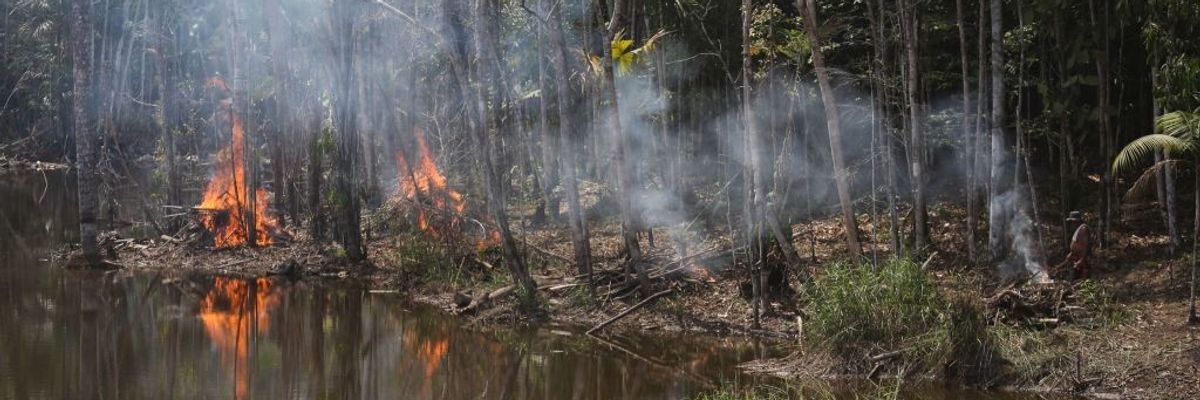Despite world leaders' pledge to halt and reverse global deforestation by 2030, the tropics lost 10% more primary forest in 2022 than in 2021.
That's the latest update from the World Resources Institute's (WRI) Global Forest Watch,
released Tuesday, which found that tropical forests had lost 4.1 million hectares, generating as much carbon dioxide as India emits from fossil fuels in a year at 2.7 gigatonnes.
"One thing is clear: What happens in the forest, doesn't stay in the forest," Frances Seymour, a distinguished senior fellow in WRI's forests program, said, as
Mongabay reported.
Seymour said that the data, gathered by the University of Maryland, was "particularly disheartening" because of its timing.
At the COP26 U.N. climate conference in Glasgow in 2021, 145 nations signed the "Glasgow Leaders' Declaration on Forests and Land Use" that
included a promise to work "collectively to halt and reverse forest loss and land degradation by 2030 while delivering sustainable development and promoting an inclusive rural transformation."
"We had hoped by now to see signals in the data that we were turning the corner on forest loss," Seymour said, as
Mongabay reported. "We don't see that signal yet, and in fact, we're heading in the wrong direction."
"Globally, we are far off track and trending in the wrong direction."
The analysis focuses on tropical forests because more than 96% of human-caused deforestation takes place there and because primary tropical rainforests are especially important for protecting biodiversity and regulating both the global climate and local temperature and weather patterns—temperatures near newly deforested areas can increase by twice the amount forced upward by the climate crisis alone.
The update found that the world lost an area of these essential forests the size of Switzerland at a rate of 11 soccer fields per minute. That's over 1 million hectares more than it should have to meet the global goal of halting deforestation by 2030, the WRI's Rod Taylor
said, as BBC News reported.
"Globally, we are far off track and trending in the wrong direction," Taylor said.
This could have serious consequences for both forest communities and efforts to limit global heating to 1.5°C above preindustrial levels. Already, the world would be around 0.5°C warmer without forests,
Mongabay pointed out.
"Since the turn of the century, we have seen a haemorrhaging of some of the world's most important forest ecosystems despite years of efforts to turn that trend around," Global Forest Watch director Mikaela Weisse
said at a press briefing reported by AFP. "We are rapidly losing one of our most effective tools for combating climate change, protecting biodiversity, and supporting the health and livelihoods of millions of people."
In some instances, it is possible that policy shifts have not had the time to take root and sprout in the data. Brazil, for example, led the world for deforestation at 43% of the world total. It saw 15% more forest loss in 2022 than 2021 and the highest level of non-fire-caused tree loss since 2005.
However, the 2022 data reflects the last year of the administration of right-wing President Jair Bolsonaro, whose policies encouraged deforestation by decreasing protections for the environment and Indigenous rights, the report authors noted.
Bolsonaro
lost the 2022 election to President Luiz Inácio Lula da Silva, who succeeded in significantly curbing deforestation during his previous term. Lula, who was sworn in in early 2023, has now promised to end deforestation by 2030.
"This will not be an easy task, with some officials cautioning that there may not be visible progress until 2024 at the earliest as enforcement agencies are re-equipped and re-staffed and illegal activities investigated," the report authors observed.
"As a consumer of the products that we export, the international community needs to not be buying products that come from deforested lands."
Catarina Jakovac, a biologist at Brazil's Federal University of Santa Catarina,
told DW that Lula—and Brazil—needed support to protect the Amazon.
"As a consumer of the products that we export, the international community needs to not be buying products that come from deforested lands," she said.
Seymour also added that, while it may take policies around the world some time to kick in, finance from wealthier countries for anti-deforestation measures is not where it needs to be.
"Collectively we don't seem to be addressing the problem as the planetary emergency that it truly represents," Seymour said, according to
Mongabay.
Other countries that saw noticeable deforestation in 2022 were DRC and Bolivia, which lost the second and third most after Brazil respectively. In DRC, forest loss is complicated and often driven by poverty as people clear forest for charcoal and subsistence farming.
"Investments to lift people out of poverty and reduce reliance on a resource-based economy are urgently needed," the report authors wrote.
In Bolivia, meanwhile, government policy that favors commodity agriculture—especially soy—encourages tree cutting. The government offers land titles to farmers who clear their own plot.
"The standing forest isn't seen as fulfilling any social or economic function," Marlene Quintanilla, a research director at nonprofit the Fundación Amigos de la Naturaleza,
told The New York Times.
Ghana broke records with its deforestation rates, with forest loss increasing in the country by 71%, the highest increase of any nation. The losses were mostly in protected areas and linked to cocoa farming, gold mining, and fires.
One positive data point came from southeast Asia, where government and corporate policy seems to be successfully curbing deforestation. In Indonesia, which led the way for reducing forest loss, the government has promised that its land use will generate a net carbon sink by 2030 and banned new logging in palm oil plantations in 2019, according to the report and
BBC News. In Malaysia, rates of forest loss have also stayed low in recent years, with a majority of the palm oil industry signing on to No Deforestation, No Peat, and No Exploitation (NDPE) commitments.




